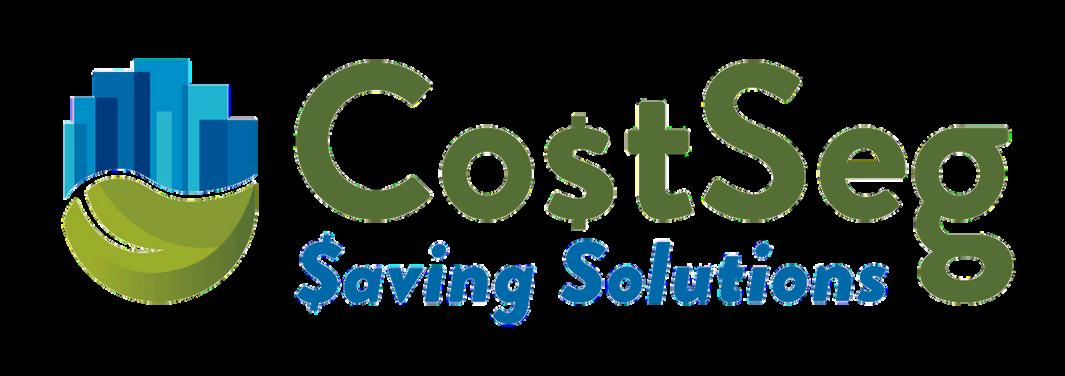FREESTATE FREESTATE













Ann
Hannah
Ellen
Michael
Matthew
Sean
Nicole
John
Chris
As we celebrate an incredible milestone our 65th anniversary I want to take a moment to reflect on how far we’ve come as a community. From our humble beginnings to becoming the trusted voice for Maryland accounting and tax professionals, we couldn’t have achieved this without your unwavering support. We’ve built something special, and I am excited for what’s to come as we continue to grow together.
One of the most exciting developments is the launch of our new website and member portal! We have listened to your feedback and worked hard to create a space that not only provides access to all the tools and resources you need but also fosters a sense of community The new MSATP Community Application offers a dynamic platform where members can chat, ask questions, share tips, and connect with one another, much like Facebook but with a professional focus This is more than just a tool; it’s a space to build deeper connections with colleagues, seek advice, and share experiences that can help us all thrive in our careers I encourage you to explore this new feature and see its impact on your day-to-day work
Another exciting update is our new partnership with Blue J, a leading software provider that specializes in tax research and predictive analytics Blue J’s cutting-edge technology uses artificial intelligence to help solo practitioners and small firms save time by automating complex tax research and quickly providing clear, accurate answers Imagine having a tool that can predict outcomes with remarkable accuracy, giving you confidence in your decisions while reducing hours of manual research I believe Blue J will be a game-changer for many of you, allowing you to focus less on administrative tasks
As we look ahead, I’m thrilled about this partnership's opportunities and encourage you to take full advantage of them.
Speaking of seminars, seminar season is fast approaching, and we can’t wait to see you there! Whether you’re attending a session to earn CPE or networking at one of our many events, we are excited to reconnect with you in person and continue growing this vibrant community. Make sure to check out our event schedule to find a session or networking event that fits your calendar.
Thank you for being part of the MSATP family. Here’s to another 65 years of success, innovation, and community!
Gigi
Coming together is a beginning, staying together is progress, and working together is success.
- Henry Ford

By Gigi Hawkins
As the Maryland Society of Accounting and Tax Professionals (MSATP) proudly celebrates its 65th anniversary, it reflects on its rich history, impact, and vision for the future Founded with the mission to serve and support accounting and tax professionals across Maryland, MSATP has grown into a vibrant community dedicated to excellence, education, and advocacy
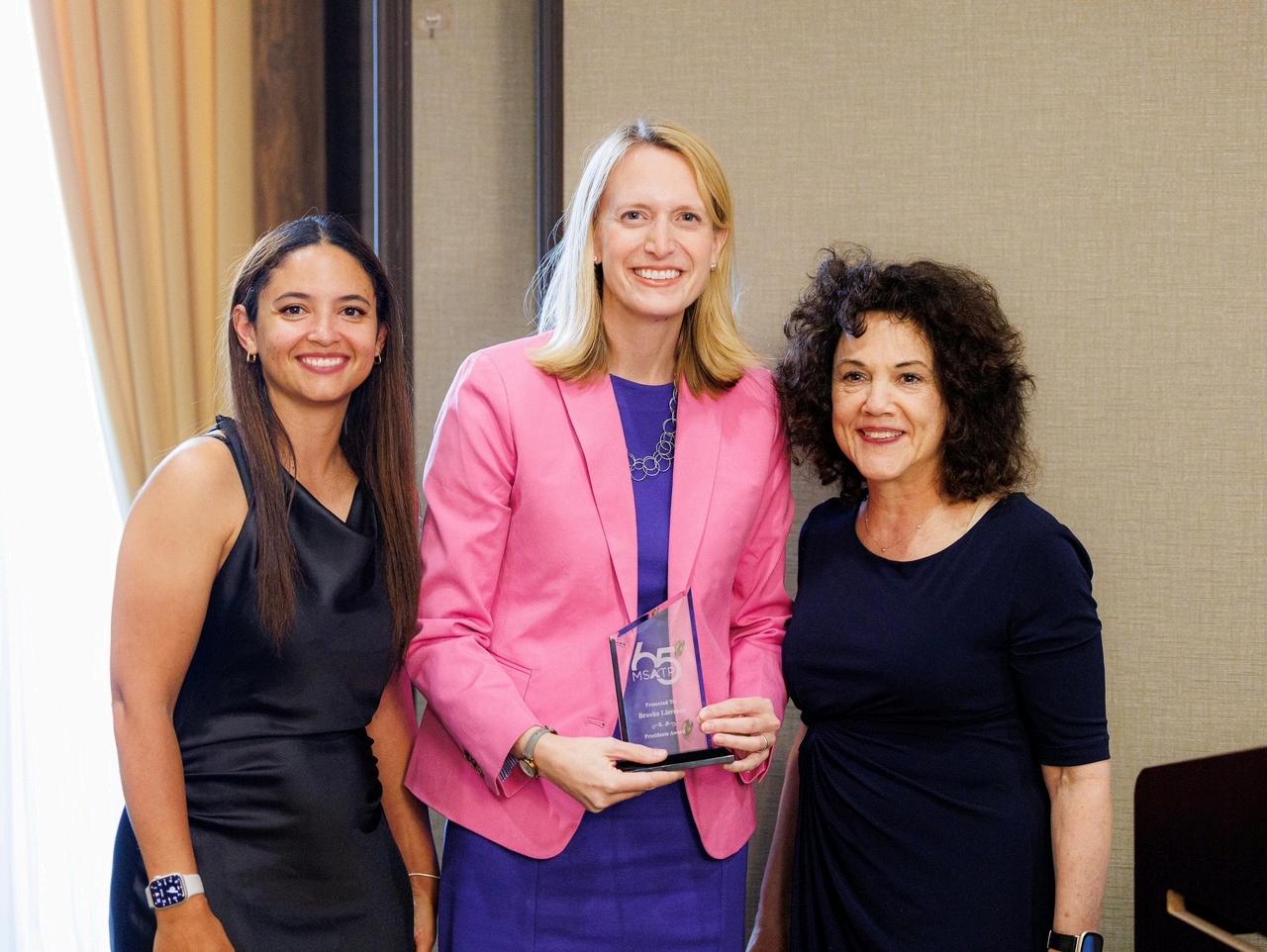
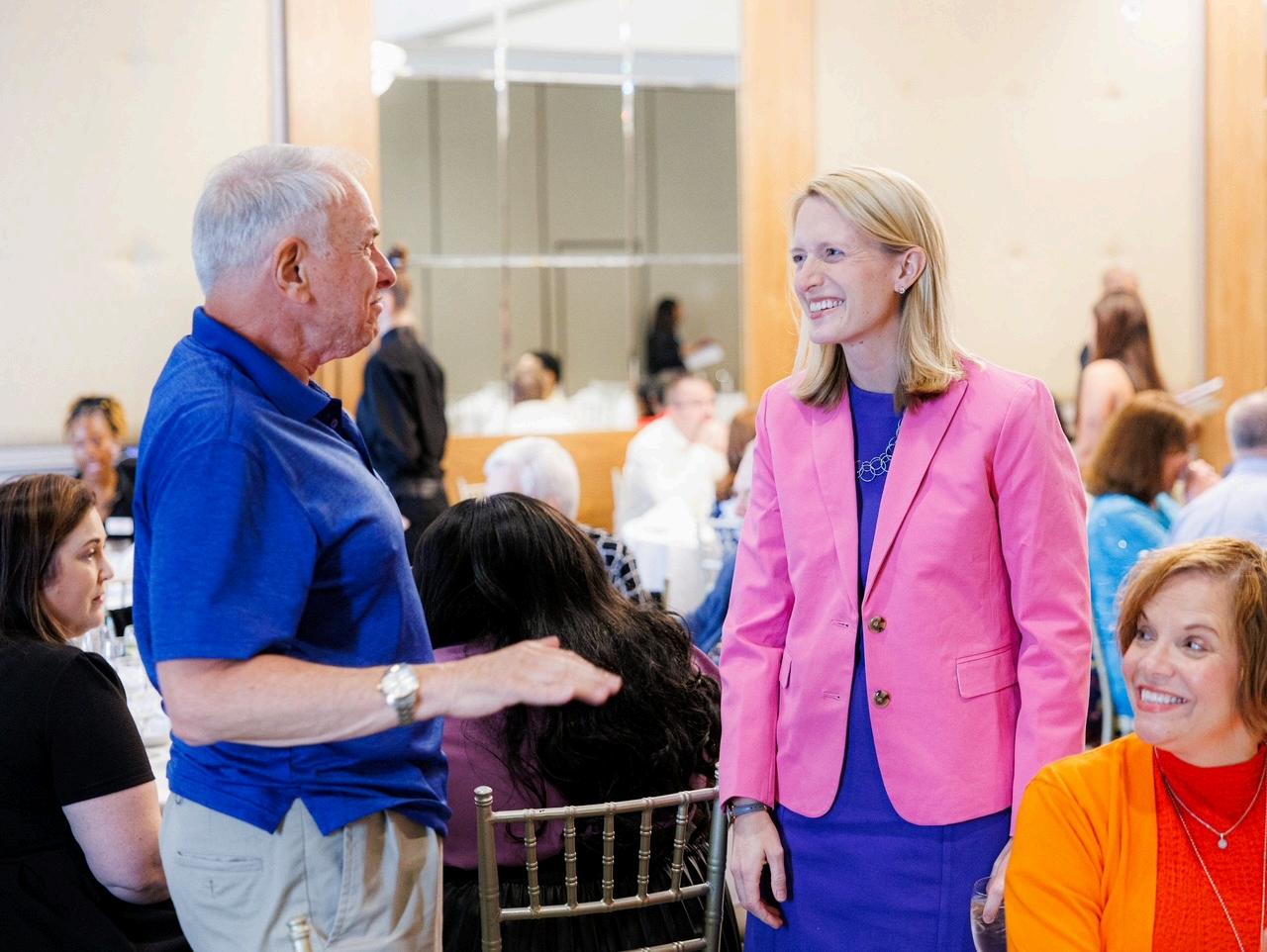
The Maryland Society of Accounting and Tax Professionals (MSATP) was established in 1959 when proposed legislation threatened to make the word “accountant” exclusive to those individuals who passed their CPA exam MSATP felt this was unjust to those professionals practicing accounting who decided not to sit for the exam, so it created a society to ensure all accounting, tax, and other financial service individuals and organizations had proper representation
Ultimately, MSATP won the battle, and the legislation was not passed, but it realized this was only the beginning of a journey It scoured the country, enrolled national speakers, and started building a best-in-class, affordable curriculum for small to midsize businesses.
This allegiance to quality education, active advocacy, entrepreneurship, and small business still sits at the heart of the Society. MSATP is committed to maintaining the professional integrity of its members and lobbying to create an environment where small to mid-size firms can thrive.
MSATP’s 65th Anniversary celebration was marked by an elegant Annual Banquet held at Ruth’s Chris Steakhouse in Pikesville, MD. The evening was a memorable gathering of the community, highlighted by the induction of the new board members and the presence of the Comptroller of Maryland, Brooke Lierman. MSATP was honored to present Comptroller Lierman with the President’s Award in recognition of her unwavering partnership with MSATP. Her efforts to provide essential resources and address longstanding issues Maryland tax preparers face have been invaluable to the members.

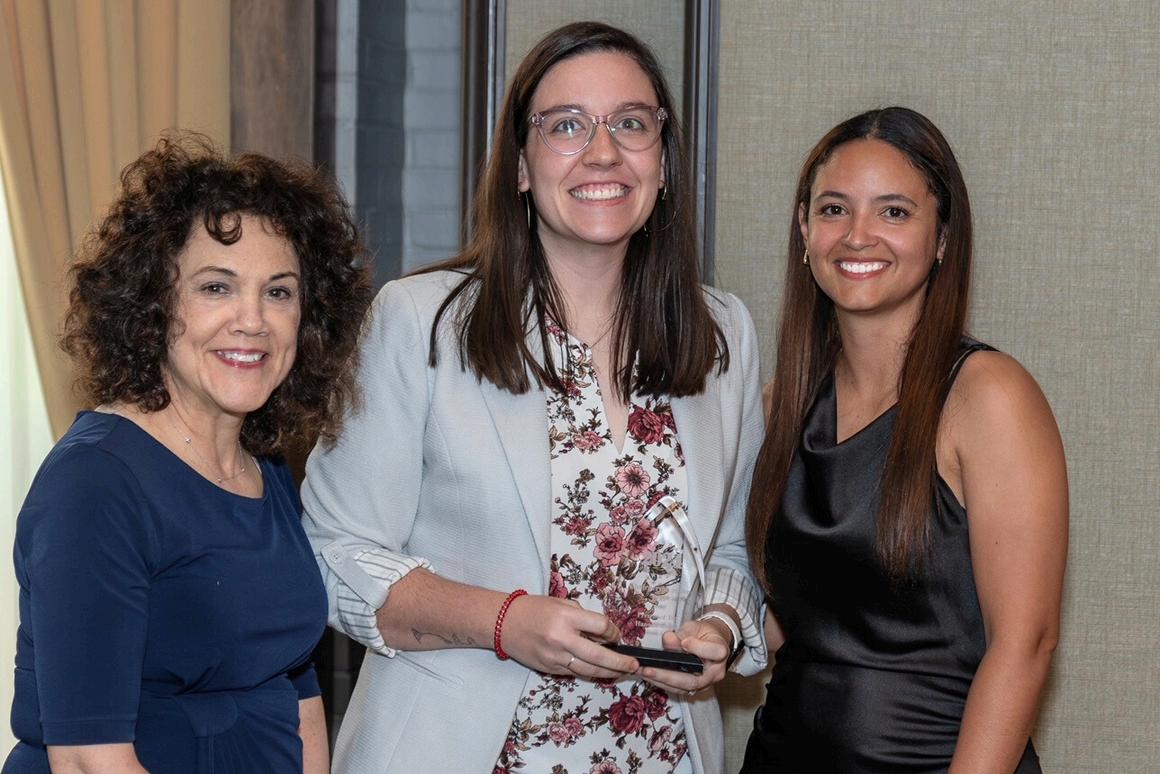
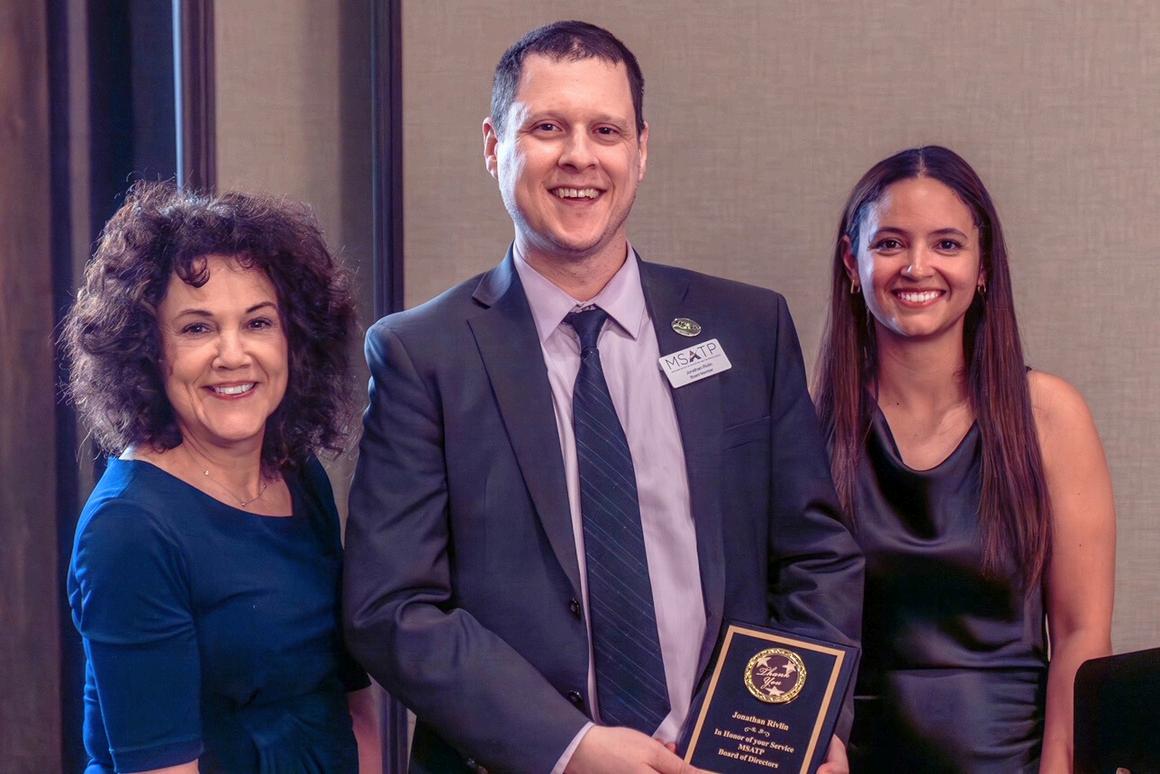
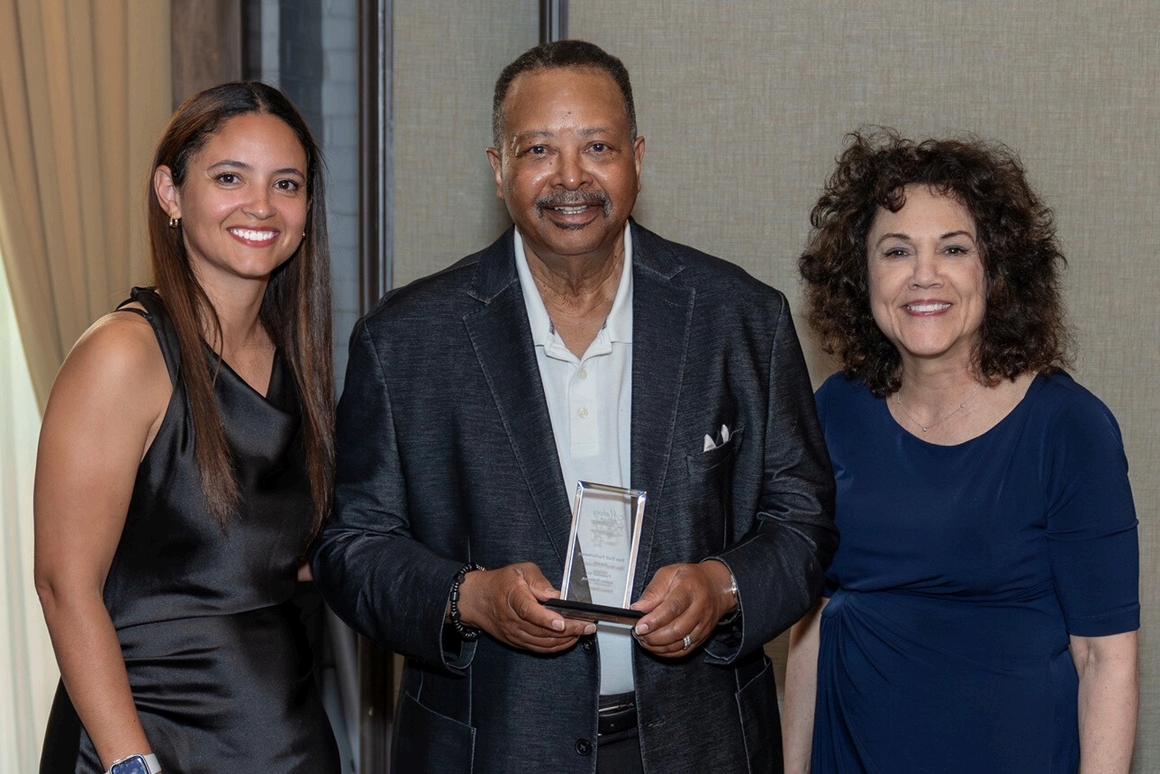
Additionally, the evening recognized several esteemed members for their contributions:
Board of Trustees Award: This award was given to Kelly Ebaugh, the Assistant Executive Director, who has been a team pillar for the past 9 years, ensuring the Society runs smoothly. Kelly’s experience in almost every role at the Society has made her indispensable, and her dedication continues to guide MSATP toward success.
Donald R. Hull Performance Award: This year, the award was presented to three individuals who played a crucial role in MSATP’s success:
Deborah Gorman from the Comptroller's Office
Christopher Dorsey, Executive Director of the Board of Individual Tax Preparers
Joshua Roberson, a dedicated member of the Society, Board of Trustee, and Past President
Sidney Weinberg Award: This award was presented to Tom Bray for his exceptional leadership, especially as Chair of the Legislative Review Process and his long-standing commitment to the Society.
Ted Schultz Memorial Award: This award, recognizing volunteerism, was awarded to John Salan, newly appointed Board Delegate, who recently took over the Chair position of the Legislative Review Process.
Chairperson of the Year Award: Hannah Coyle, Director of Education, received this award for her exceptional leadership in advancing MSATP’s premier education programs. Her vision and commitment have made a significant impact on the Society.
Board of Directors Service Award: This award was presented to Mike Kohler, Jonathan Rivlin, and Christine Giovetti for their outstanding service and dedication as members of the Board of Directors.
Golden Quill Award: This award was given to John Hardt, Director of the MVLS Low Income Taxpayer Clinic, for his outstanding contributions to MSATP publications.
Media Excellence Award: Frost Law received this award for their invaluable contributions to MSATP’s publications, providing insightful and valuable articles to the Society’s members.
Outstanding Young Professional Award: Matthew Eddleman, a dedicated volunteer and Board delegate, received this award for his exemplary professionalism and ethical conduct in the profession.
Certificate of Special Recognition: This award was presented to Andrea Foster for her exceptional dedication and volunteerism over the past year, which has significantly contributed to the MSATP community.
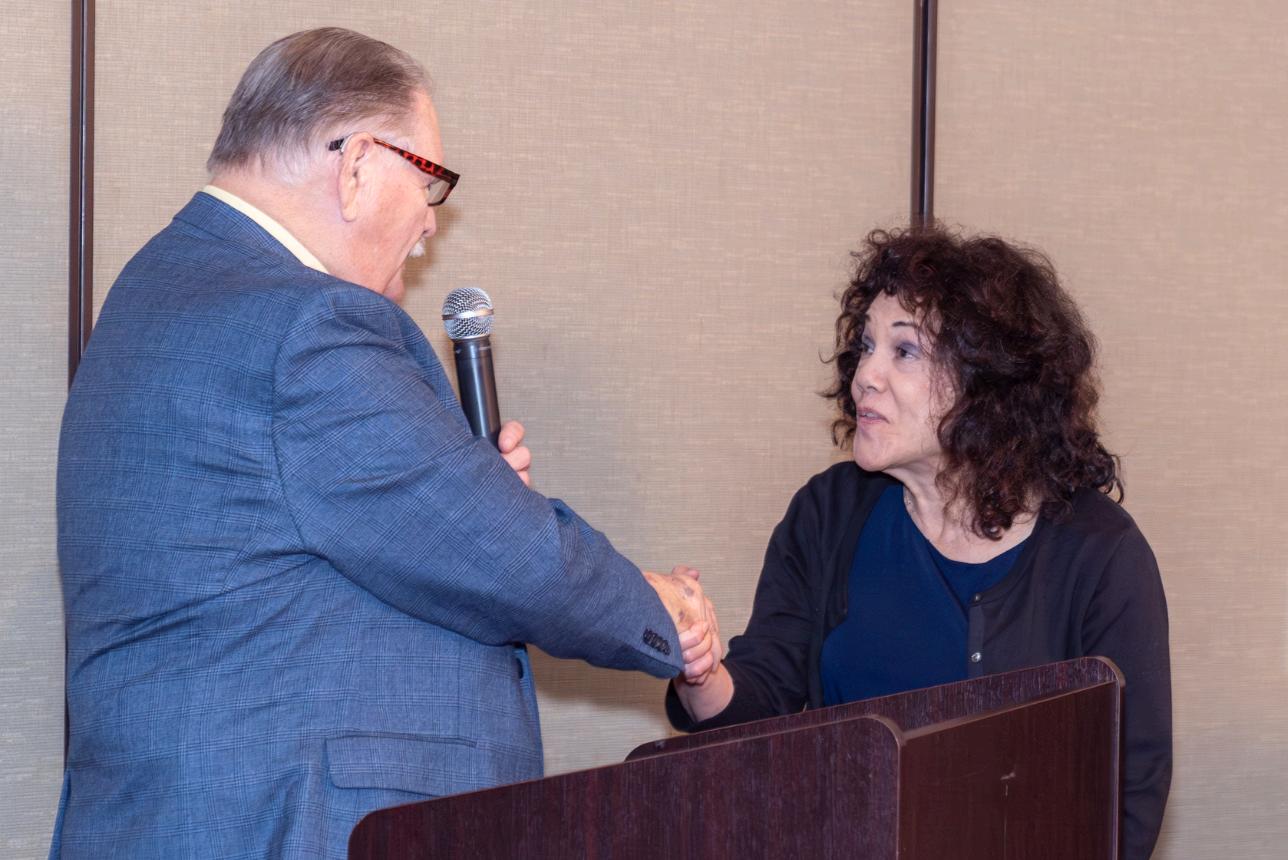
MSATP is excited to announce the new leadership team who began their term on July 1, 2024:
President: Donya Oneto, CPA
Past President: Barbara Smith, CPA
Board of Trustee Delegate: Bob Medbery, CPA
Treasurer: Michael McIlhargey, CPA
Secretary: Ellen Silverstein, CPA
1st VP: Ann Elliott, EA
2nd VP: Hannah Coyle, EA
Delegates:
John Salan, CPA
Christopher Williams, CPA, CFP
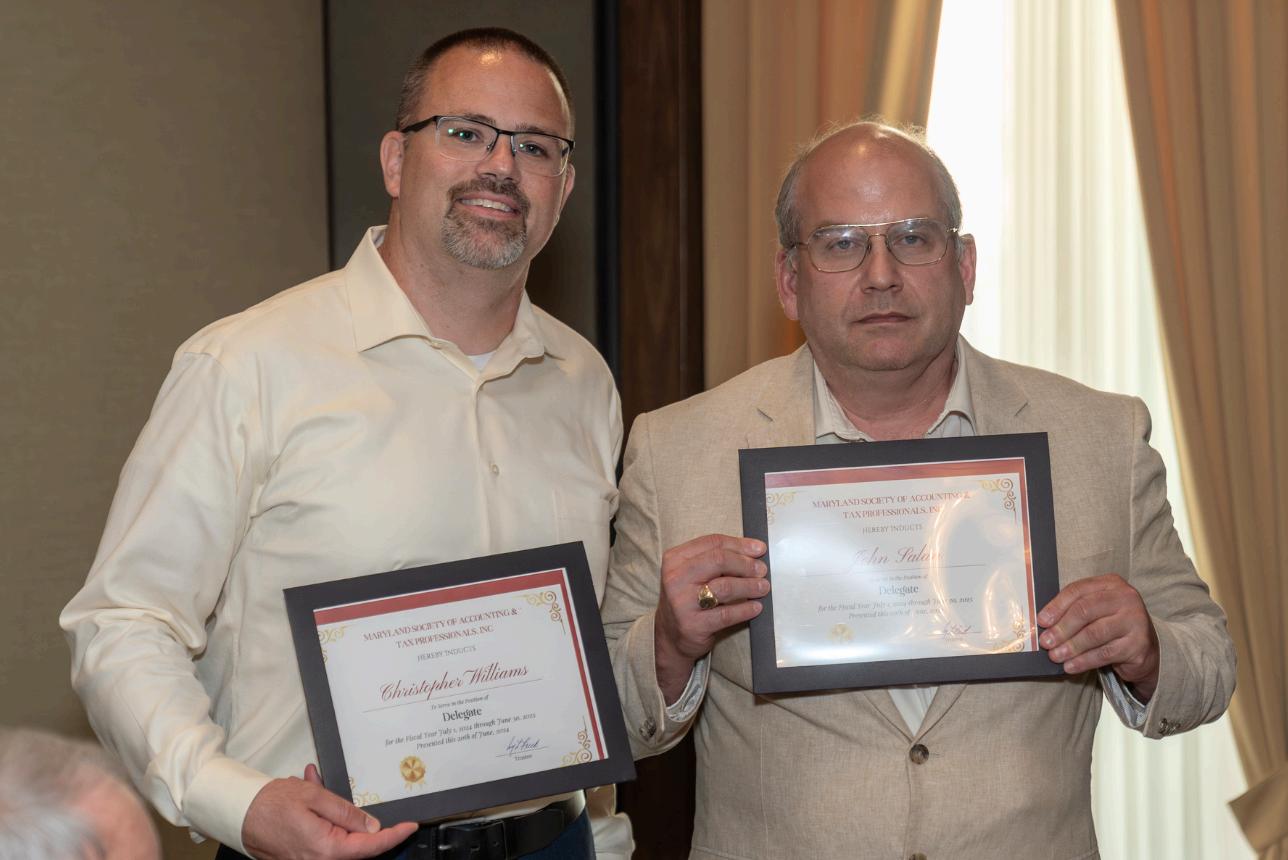
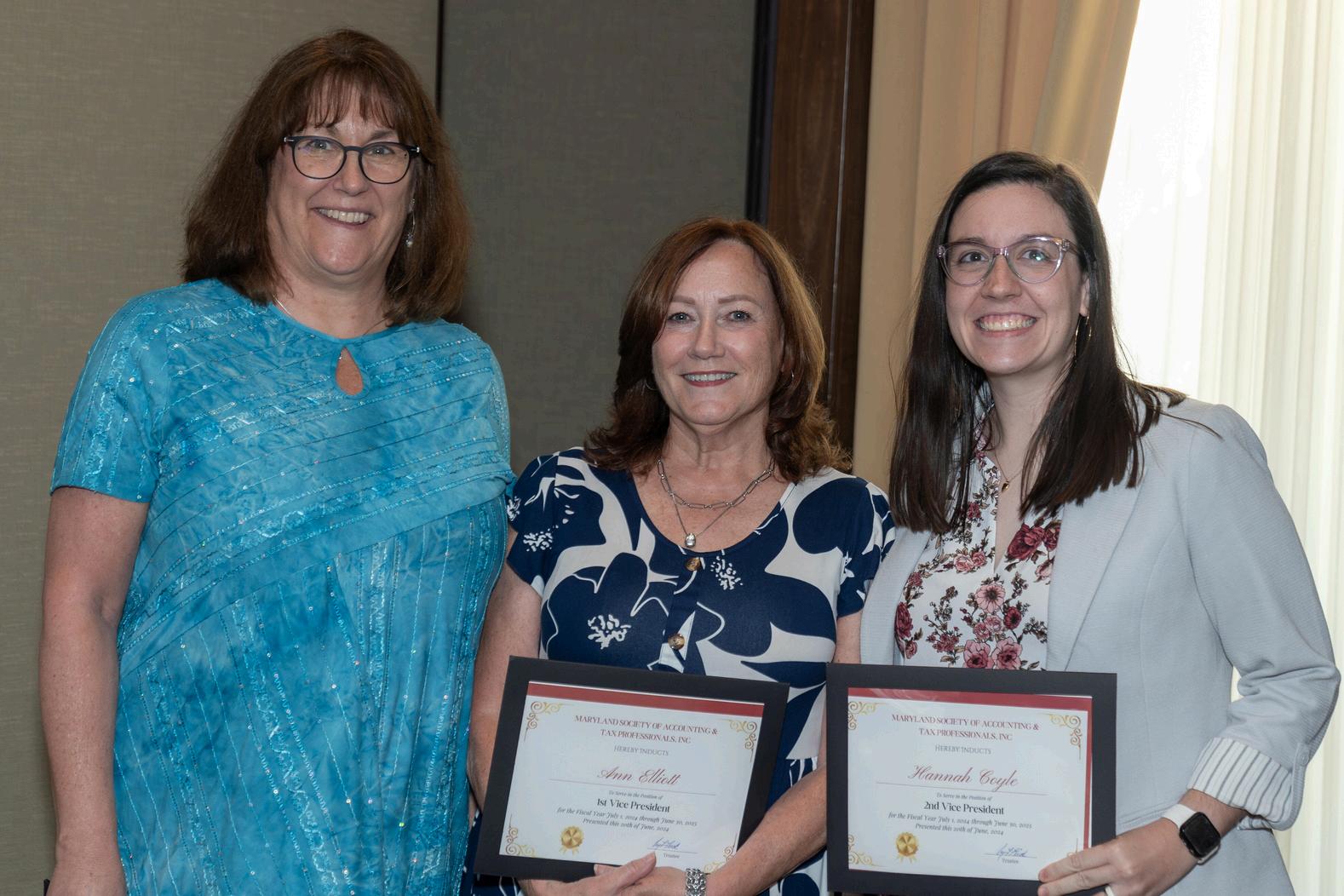
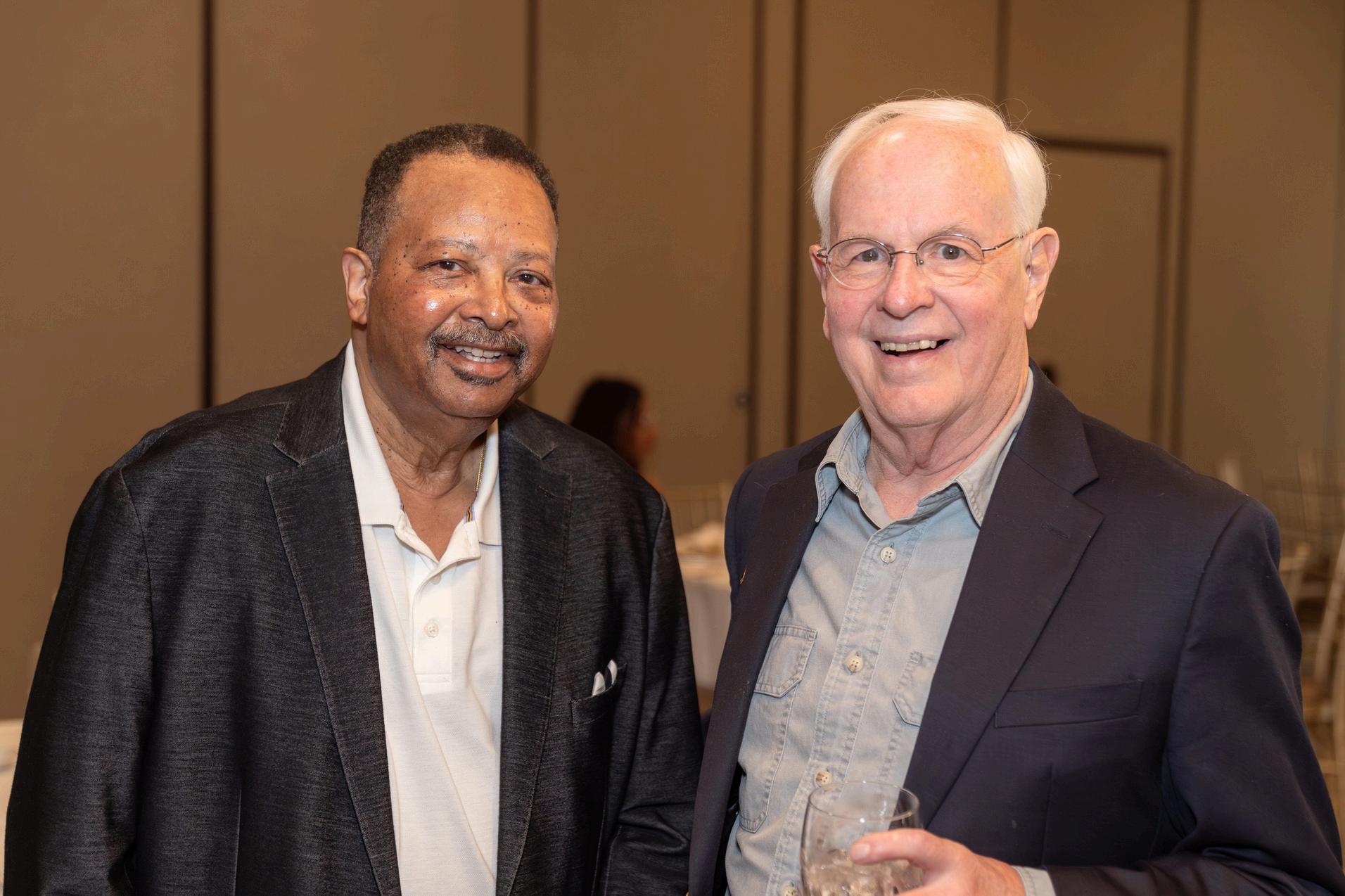
Nicole Moore, EA
Sean Coggins, CPA
Matthew Eddleman, EA
Executive Director:
Giavante’ Hawkins
These dedicated professionals bring a wealth of experience and a shared commitment to guiding MSATP toward continued success.
As it celebrates this milestone, MSATP remains committed to its core values of inclusivity, education, and advocacy. MSATP continues to be the voice of Maryland’s accounting and tax professionals, striving to enhance the professional lives of its members through comprehensive resources, networking opportunities, and continuous learning.
By Ben Skrajny, Bellator Cyber Guard
n an era where digital threats are escalating, compliance with evolving regulations is not just a regulatory formality—it's a vital safeguard Staying ahead of regulatory changes is critical The recent updates to IRS WISP 5708 serve as a timely reminder of our ongoing responsibilities in safeguarding our digital environments
Small businesses, traditionally less equipped to deal with sophisticated cyber threats, find themselves increasingly targeted. As accountants and tax professionals, our role extends beyond mere compliance; we are custodians of highly sensitive financial data The evolving threat landscape necessitates a proactive approach to security, making it imperative to understand and implement updated compliance measures effectively
The IRS and Security Summit have significantly revised the WISP, making it more comprehensive to better protect against identity thieves and data breaches This update, crucial for small to mid-sized practices, includes essential best practices like the implementation of multi-factor authentication—a step that IRS Commissioner Danny Werfel emphasizes: “Tax professionals play a vital role in the nation’s tax system, and they hold a vast amount of taxpayer information that can be a treasure trove to identity thieves,” Werfel noted, adding, "The newly updated Written Information Security Plan provides a helpful roadmap for tax pros to help protect their clients and themselves from the constant threat of data breaches. The IRS and the Security Summit partners urge tax pros to stay on top of these evolving threats, and this updated plan is an important part of that effort ”
The IRS’s Written Information Security Plan (WISP), particularly under IRS Publication 5708, outlines stringent requirements for protecting taxpayer information Recent updates have emphasized the need for these plans to be not only comprehensive but also actively maintained by qualified individuals
This new mandate underscores the need for a quick and efficient incident response plan, ensuring that practices can respond to and mitigate damages swiftly This ensures that the protective measures evolve in tandem with emerging threats, providing a dynamic shield against potential breaches
Creating a WISP is not merely a regulatory tick-box exercise. It is a fundamental aspect of business security. Where financial professionals handle sensitive information daily, the role of a qualified individual in preparing a WISP is indispensable. These professionals ensure that your security protocols meet current standards and adapt to new threats as they arise, offering more than just compliance— they offer peace of mind
As we navigate these regulatory waters, the importance of immediate and proactive security measures becomes clear Tax professionals should not wait for PTIN renewal deadlines to dictate your security enhancements Consult with your IT professionals or seek out qualified individuals to create or update your WISP today In doing so, you safeguard not just your compliance standing but the very integrity of the businesses and individuals you serve
In conclusion, the updated IRS WISP 5708 is not just a regulatory update—it's a critical enhancement to the security protocols that protect the backbone of our financial infrastructure. Tax professionals are encouraged to review, understand, and implement these changes swiftly. Protecting your clients and your practice is not just a professional responsibility—it is an ethical imperative Let us take action today to ensure our security and compliance strategies are as resilient as the businesses we support
As businesses scale, the simplest concept rears its head in all businesses: Accountability.
If you aren’t struggling with it in your organization, I would say you are either too harsh on your current team or you might not be completely honest with yourself In small teams, accountability is simple Everyone is right there You may have only a handful of people to work with and communicate with It’s very easy to see if a ball is being dropped As you scale, whether increase business or team members, it becomes a challenge.
How much accountability is good? How much is too little? How does it affect the culture you’ve been building for so long? Who on your team is going to complain?
Each of these will be largely dictated by the industry you are in. As you continue to grow these items will change, again and again. You will add new layers to the onion.
We have experienced our own growing pains at times and are constantly in a state of learning and developing
Attendance, mid-day appointments, project management, etc So how do we correct this? How do we put some form of accountability and expectations that we can run a growing business? How do we do it with current team members that are used to the “old norms”?
It’s easier said than done, however there are some core pieces that must be put in place to conquer the problem.
Creating clear expectations that can be measured is the first step in building the foundation. We live in an age where data is king. What data can you use in your current systems? Each business which has customer service, has either documented or “understood” metrics to gauge if we are doing our job right Creating data to measure to this expectation must be implemented We are re-creating this as we speak so we can give clear expectations to our team as to what we expect and how it is measured
Now that a measurement has been created, what are the consequences when they miss them or exceed them? There has to be both stick and carrot
Traditionally, businesses use a “Performance Improvement Plan (PIP)” as a stick to ensure expectations are correct I do not disagree; however, we prefer active feedback through one on ones to address shortfalls. If the problem consists, the PIP’s purpose is to move someone out. How you dictate shortfalls will largely be based on the entire team first, then the individual.
When individuals exceed (notice I said exceed not meet), the expectations they should be rewarded. Incentivization plans work great for this, and will truly show who is part of your “ A Team” This is also a great way to structure new compensation for employees that may be topping out on the pay scale
The bigger problem is your team adjusting to the new norm Similar to when someone starts working out A 5lb weight may seem heavy until their muscles are used. There is no easy solution to this and it comes down to a business decision. What every manager hopes is that the team may express initial disagreement, but then understands “it is what it is” and conforms. When individuals do not conform, the only solution is to move them out.
As business owners are job is to run a successful business. That means adapting and adopting change in our organizations We must be firm in our beliefs when we jump off the cliff and be quick to adjust if we aren’t landing where we need to Change is tough on everyone but we must be willing to change
This is why one of our core values is “be willing to change ” If you can’t change, should you be here?
“They’re Ba-ack!”
Written By: Jonathan Rivlin, CPA
Many members of The Maryland Society of Accounting & Tax Professionals are old enough to remember a more active, and some would say aggressive, Internal Revenue Service. And many younger entrants to our profession have no such institutional memory
In the first twenty-five years of my career, I worked on two IRS audits. In the summer of the twentysixth year of my career (in other words, back in July’24), I had two clients receive Information Documentation Requests, (or IDRs among the practiced practitioners.) Ahh, good old Form 4564, a veritable blank canvas for which the revenue agent charged with the audit can paint over any accountant’s carefully curated calendar –assuming that our clients give us the form in time, but that’s a matter for a different article
Both recipients of said IDRs couldn’t have been more different from a human perspective, and yet they did share a couple of key details, chief among them being the presence of a Schedule C and their gross revenues were in excess of four hundred thousand dollars. Both IDRs were mailed in late June with responses due by early July. Both IDRs were for tax year 2022.
Obviously, I can’t go into more detail than this for confidentiality purposes, but I can say that having the cloud made (one of) the audits go quite smoothly. There’s two words that don’t often appear together; ‘audit’ and ‘smoothly’. And yet, it’s true!
Most of the items in the IDR were relatively easy to procure thanks to Xero (general ledger), Canopy (secure portal), and Gusto (payroll). The revenue agent asked for a narrative to qualitatively explain the situation beyond the quantitative information in the financial documents. Both sets of documents were *easy enough* to produce and organize and tender to the revenue agent.
Many readers may want to know what the IRS was looking for and why these particular taxpayers won the ‘lottery’ (a euphemism for getting selected for an audit). I can’t specify that information without breaching confidentiality, but here is what I can say:
All these past years of exhorting our clients to keep a mileage log, a meals and entertainment log, organize their expenses in some type of ledger software (such as Xero or…QuickBooks), all these back and forths with people about what is deductible and what isn’t (You haven’t lived until you’ve told an artist that their studio really falls more under IRC 183 than IRC 162), finally bore some fruit.
The IRS agents – there were two present at this particular audit – noted that, “We made the client look good ”
And while after so many arduous hours, and days, and weeks, and months, and years, and decades in this profession, that simple acknowledgment from our counterpart on the other side of the table felt good, the reality was that it starts with a client that wants to comply
If the client didn’t follow our advice, didn’t implement Xero, didn’t provide us bank statements and receipts in a timely manner, provide answers to questions that didn’t raise more questions, we wouldn’t have been able to play our part in this little dance.
Most taxpayers that I’ve dealt with want to comply with the laws, as best they are able And also no client can ever be ‘audit-proof’. Speaking of which, these two words, ‘audit’ and ‘proof’ should not be spoken together because it is a misleading term. The tax collector always has the right to inspect the documents of the taxpayer ‘Change-proof’ is a more accurate description of what we should be striving for.
I don’t mean to underplay the stress of this particular audit. It’s not a fun thing to receive an IDR Even for a ‘smooth audit’, a significant amount of time and energy is spent in preparation Still, the term *easy enough* used earlier in this essay is relative; it could have been traumatic.
So how should we as professionals take this awakening of the IRS’ enforcement arm?
There are some that rail against it as government overreach and there are others that say it’s a chance to raise fees and market our services. While both have their kernels of truth, they both miss something
At a macro level, at the level of society, we need an enforcement of our laws to protect the integrity of the system. When tax evasion becomes the national pastime, the security of the entire country is threatened
And also, at the micro level, at the level of the individual who receives an IDR, the process can be devastating at worst and highly stressful at best –even if it results in a ‘no change’ letter.
So yes, as long as our tax laws will include exemptions, allowance, adjustments, deductions, and credits, then we’re going to need an enforcement to keep some taxpayers from stealing from their fellow taxpayers. (It’s ‘We the people’ attempting to perfect our union.)
And also, there’s something about raising fees specifically for representation that doesn’t feel quite right I built my career on trying to build value for my clients. Representation in an audit doesn’t feel like a value-add in that it doesn’t grow the top line or bottom line, or one’s net worth; it’s a defensive action at best.
I can’t tell you what you should do, but for my part, with this coming tax season, we will be focusing ever closer on our clients’ attitude towards compliance. Not that we didn’t focus on it before, it’s just that now this topic will have a greater emphasis in our discussions with clients and prospective clients
And closing out on a positive note – this is the value add; specifying that you as a professional put compliance front and center as the cornerstone of your service offering is one of the main reasons they should consider working with you
We can’t prevent an audit, nor should we, but we can decrease the likelihood of an audit adjustment.
At any rate, be prepared for more IDRs to come and hone your service offerings (and engagement letters) accordingly.
Jonathan Rivlin is a CPA practicing in the Baltimore metropolitan area He has been a member of the MSATP since 2002 and served on the Society's Board of Directors from 2018-2024.
JOHN HARDT, MARYLAND VOLUNTEER LAWYERS SERVICE LITC
Nowadays, many Americans seem numb to the constant news of data breaches and identity theft Still, one headline story from last week was surely enough to make some readers do a double take: “Hackers may have stolen the Social Security Numbers of Every American Here’s how to protect yourself.” (Healy, LA Times 8.13.2024). Many tax practitioners are already keenly aware of the threat tax-related identity theft poses to both them and their clients. Proper cybersecurity measures for businesses dealing in client’s personal tax information are now a professional necessity in today’s environment And yet, even organizations as large and as security-focused as the data broker featured in the above story, National Public Data, have had their security defeated by hackers.
How, then can the IRS work to ensure that taxpayers are protected from having their tax accounts plagued by falsely filed returns and misdirected refunds? It’s a complicated subject, but as a starting point, it’s clear, to this practitioner at least, that there is significant room for improvement In our Low-Income Taxpayer Clinic in Baltimore, it’s clear to have clients come in looking for help paying a liability arising from a return filed in their name by someone else. Sometimes it was filed by a stranger, sometimes a family member or supposed friend, and sometimes even by an unscrupulous tax preparer they had once hired before, now filing in their name. We always at least suggest these clients request a credit freeze, call their bank, visit identitytheft gov, and prepare to file an Identity Theft affidavit with the IRS We can then work to connect them with one of our volunteering tax professionals, who will work with them to pursue whatever specific relief is available to them in their situation.
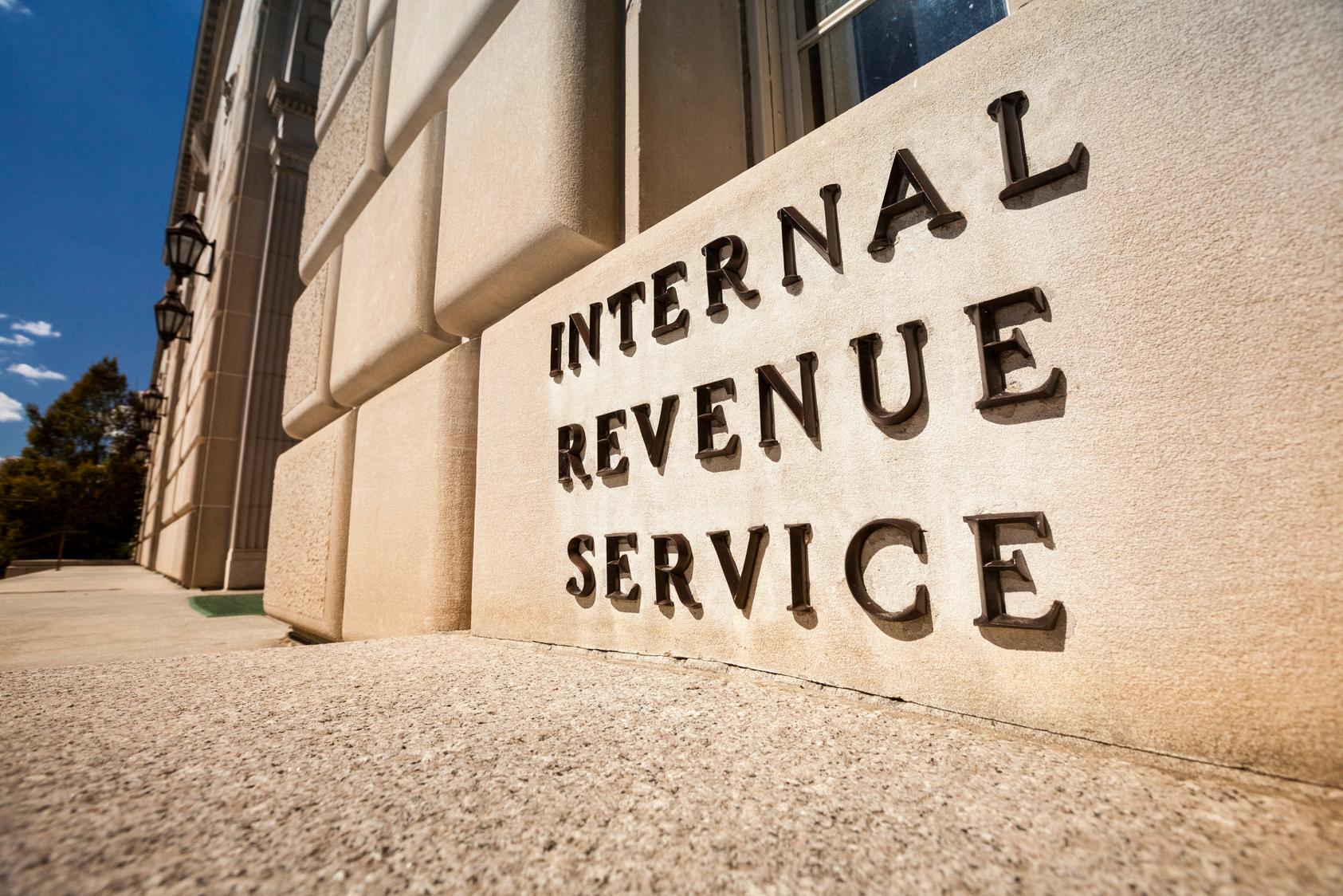
While we help as much as we can on our end, our volunteers frequently run up against limitations in the federal tax system Currently, the IRS takes a teethgrindingly frustrating 22 months on average to resolve Identity Theft Victim Assistance (IDTVA) cases For our lowincome clients, that means their tax refunds, sometimes one of the largest checks they receive all year, aren’t going to get to them for another 2 years, if the IRS ends up issuing them at all. There is only so much even a dedicated and professional tax practitioner can do if the IRS simply doesn’t respond
These unacceptable delays have recently received attention from the National Taxpayer Advocate, and subsequently the mainstream media. In one reported emailed response from the IRS, the agency acknowledged the delays on identity theft cases as a problem area they are working to address. The IRS, and the Taxpayer Advocate, have been consistently optimistic about the effects of the extra funding provided to the agency in the Inflation Reduction Act on IRS processing times across the board Time will tell if the necessary resources are allocated to help fix the IDTVA debacle.
With remedies for identity theft often so limited, taking measures to prevent identity theft in the first place becomes even more critical. One of the most direct ways the IRS can help a taxpayer prevent tax-related identity theft, or at least to prevent someone from filing in their name, is by issuing them an Identity Protection PIN, or IP PIN This six-digit identifier, regenerated and reissued to the taxpayer every January, functions as a form of multifactor authentication for submitted returns. Returns submitted without a correct IP PIN are flagged or rejected outright, preventing fraudulent returns from being accepted. This isn’t completely perfect protection, of course, but it adds a helpful layer of security
For many of our clients, the IP PIN program also lets taxpayers receive IP PINs for their dependents as well, a useful way to ensure that only the taxpayer entitled to claim the dependents is the one who is able to claim them on their return.
Still, this program is optional, and in some cases, it isn’t a good fit for our clients. In several cases, due to changes in address, lack of internet access or just plain lost mail, our clients have not received their IP PINs when they are supposed to This leaves them in a position of being unable to verify their identity, whether they are entitled to claim a dependent, or both. And of course, for those clients who don’t keep precise track of all their mail, the time between when they receive their IP PIN in January and when they are required to file is long enough for the information to go missing The nature of this program requires that retrieving a lost PIN involves further identity verification, which takes time and sometimes further help from a tax practitioner Finally, there is currently no way for a taxpayer to opt out of the IP PIN program – meaning that if problems persist, they can’t try to replace it with another option.
For the IRS to live up to taxpayer’s expectations of delivering security measures against identity theft, it must make improvements to both how it responds to reported cases and how it works to protect taxpayers from having their identity stolen The delays of the IDTVA and the limitations of the current IP PIN programs are just two examples of places in the federal tax system where taxpayers could be better served. Practitioners throughout the country should continue to advocate for changes to the law and IRS systems that better protect taxpayers from increasingly organized and sophisticated identity theft operations
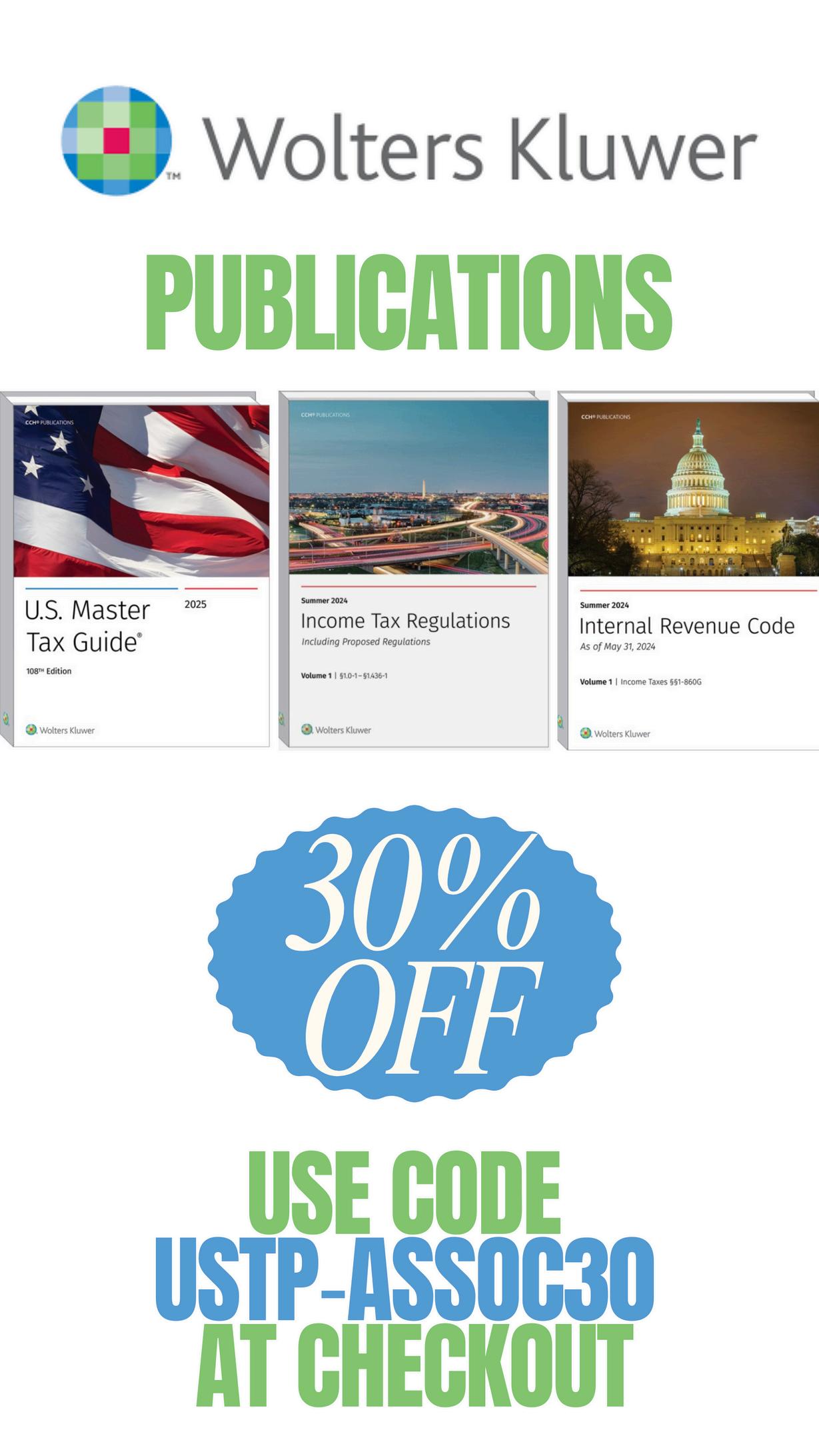

By Katie Cardinal, MSATP
The Maryland Society of Accountants (MSA) Foundation is proud to announce the recipients of its scholarships for the 2024-2025 academic year. This year, 25 outstanding students have been awarded scholarships, doubling the number of recipients from the previous year. In total, the Foundation has distributed $60,000 in scholarship funds, supporting students majoring in accounting or related fields, such as business administration with an accounting concentration.
This year’s recipients represent a diverse group of future professionals, each committed to furthering their education and contributing to the accounting field. These scholarships provide financial assistance to students from a variety of institutions across Maryland, helping to ensure that the next generation of accountants is well-prepared to meet the challenges of the profession.
In addition to the general scholarships, three students received special recognition for their exceptional achievements:
Andrew Polun was honored with the Norris “Dave” Crockett Award.
Vanessa Virgil received the Melvin Menes Award.
Jaclyn Jacobs was awarded the George Spriggs Jr. Award.
These awards highlight the commitment and talent of these exceptional students, who have demonstrated both academic success and a passion for advancing in the accounting profession.
2024-2025 Scholarship Recipients
Akshita Alousyes – University of Maryland
Abby Benton – University of Maryland, College Park
Katie Boettinger – University of Baltimore
Riley Bruce – Salisbury University
Urszula Cieslak – University of Maryland, College Park
Philip Clarke – University of Baltimore
Patrick Gogarty – Hood College
Hayden Gourley – Bridgewater College
Anaya Harris – Stevenson University
Carina Hernandez-Soto – Towson University
Dorian Houssou – University of Maryland, College Park
Jaclyn Jacobs – University of Maryland, College Park
Sharon Lee – University of Maryland, College Park
Kenya Medrano – Towson University
Jennifer Osorio – University of Maryland Global Campus
Oyebowale Oyeniran – Stevenson University
Andrew Polun – Towson University
James Puii – Towson University
Samuel Quinteros – Towson University
Tylek Simms – Towson University
Mackenzie Thompson – University of Maryland
Connor Utz – Towson University
Khanh Vi Doan – University of Maryland, College Park
Wilber Villeda – University of Maryland, College Park
Vanessa Virgil – Salisbury University
The MSA Scholarship Foundation relies on the generous donations of its members and supporters to continue this vital work. By contributing, you help ensure that talented and deserving students receive the financial assistance they need to succeed.
Donations can be made easily through the MSA website or by contacting the MSATP office. Every contribution, no matter the size, directly impacts the future of the accounting profession by empowering the next generation of professionals.
Additionally, we invite all members to join us at our Annual Holiday Soiree on December 7th, where we will be raising funds to support the scholarship program. This festive event is not only a great way to celebrate the holiday season with your peers, but also an opportunity to contribute to a meaningful cause.
Your support helps to shape the future of accounting by providing students with the resources they need to thrive in their educational pursuits and beyond. Thank you for being a part of this important work.


To learn more about how you can maximize your MSATP membership or if you have any questions, please don't hesitate to reach out. Reply to this email or contact our member services team at (800) 922-9672 We're here to help you get the most out of your membership and support your professional success.


Discounts on Seminars & Webinars
MSATP members enjoy exclusive discounts on seminars and events, allowing you to stay up-to-date with the latest industry trends and best practices while saving money on registration fees
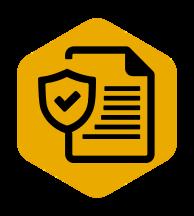
Exclusive Verifyle Platinum Subscription
As an MSATP member, you receive an exclusive Verifyle Platinum subscription, which provides unlimited digital signatures This feature streamlines your client interactions and simplifies the document signing process
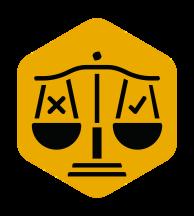
Free Ethics CPE Credits
Maintain your professional designations with ease by earning FREE Ethics CPE credits through MSATP This benefit helps you meet your designation's requirements without additional costs
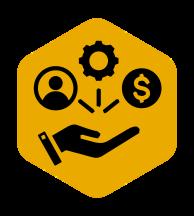
Exclusive Discounts on Essential Resources
Enjoy exclusive discounts on essential resources such as Talking with TaxSpeaker, the TaxBook, QuickFinder, Blue J, and many others These discounts help you access the tools and information you need while keeping costs down

Free Access to CCH TaxAware
Stay informed about tax-related matters with free access to CCH TaxAware, a valuable resource for tax professionals

Complimentary Unlimited Subscription to Earmark CPE
Earn CPE credits on the go with a complimentary unlimited subscription to Earmark CPE This benefit allows you to conveniently maintain your professional development whenever and wherever you choose

Attendance to Monthly Business Builders ThinkTank Groups
Benefit from attending MSATP's monthly Business Builders ThinkTank groups, where you can learn from and collaborate with other solo and small firm professionals

Vibrant Community of Solo and Small Firm Professionals
As an MSATP member, you become part of a vibrant community of solo and small firm professionals who offer support, collaboration, and a wealth of knowledge to help you succeed in your practice


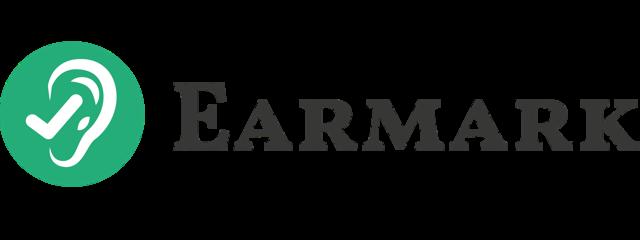
FREE access to Verifyle Platinum. If you haven't done so already, it’s time to safeguard your client’s information and enhance your practice’s efficiency. Verifyle Platinum is an ultra-secure document storage and communication platform designed with professionals like you in mind. It offers a space to share, store, and communicate securely.
Earmark CPE
With Earmark's Unlimited Subscription, members can enjoy unlimited free CPE courses every week, an ad-free experience within the app, and the option to skip sponsor messages during registration for sponsored courses. It's a game-changer for professionals in small firms, providing a convenient and affordable education.
As a NASBA-approved CPE sponsor and IRS-approved CE provider, Earmark offers a vast range of courses covering accounting, tax, technology, fraud detection, personal development, practice management, and more. Our CPAs, CMAs, and EAs can now meet their continuing education requirements simply by tuning in to insightful podcasts. We're particularly excited about the exclusive Federal Tax Updates podcast, which provides biweekly federal tax news and analysis.
CCH TaxAware

Quickly and easily get answers to all your federal and state tax questions in one place! Don’t waste time searching various resources for crucial news and information that you need quickly.
Housed on the powerhouse platform, CCH® IntelliConnect®, the Wolters Kluwer TaxAware Center has all the state and federal tax news, information, and tools necessary for today’s tax professionals.
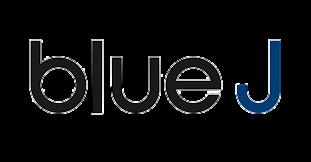
Blue J is a cutting-edge software platform that specializes in tax research and predictive analytics, using artificial intelligence (AI) to streamline complex tax decision-making. It helps tax professionals, including solo practitioners and small firms, save time by automating research tasks and offering predictive insights based on the latest tax laws and case rulings.


